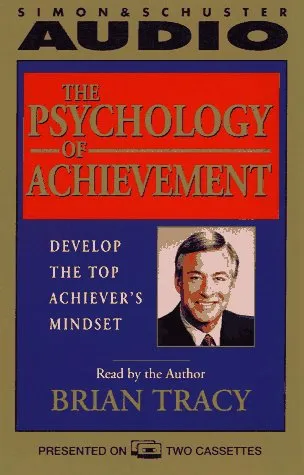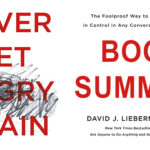6 Requirements of Success
1. Piece of mind. Freedom from fear, anger and guilt.
2. High levels of health and energy.
3. Loving relationships.
4. Financial freedom.
5. Worthy goals and ideals.
6. Feeling of personal fulfilment. (Self actualisation – Maslovs Hierarchy of Needs)
– Once we know how we work we have to make efforts.
Basic principles
– Law of Control: we feel good about ourselves to the exact degree that we feel we are in control of our lives.
– Law of Accident: by failing to plan, you are planning to fail. Let accidents happen like bumper cars.
– Law of Cause and Effect: For every effect, there is a specific cause. There is a reason for everything that happens and nothing is an accident. Thoughts are causes and conditions are effects.
– Law of Belief: Whatever you believe with feeling becomes your reality. You are the sum total of your belief systems to this moment. If it doesn’t match your beliefs or is contrary, it will not enter. These beliefs have been shaped since your childhood and some may not serve you any more or at all.
– Law of Expectations: Whatever we expect with confidence becomes our own self-fulfilling prophecy.
1. Expectations that our parents and bosses have of us.
2. Expectations of our spouses, children and people who look up to us.
3. Expectations we have of ourselves. Always expect the best of ourselves.
– Law of Attraction – we attract people and things into our lives that harmonise with our dominant thought. What is reality today is the result of our dominant thought patterns.
You are not what you think you are, but what you think, you are.
– Attitude: Positive mental attitude is a requisite for success.
– Expectations: Our attitude comes from our expectations about outcomes. If you expect good outcomes, you have a good attitude.
– Beliefs: Expectations are manufactured to the degree to which we believe the source. E.g. the friend who lied to us that we won the lottery because we were having a bad day and the day went fantastic after… until you strangle the friend.
– Self Concept: Our beliefs are based on our self-concept. We always perform in a manner consistent with our self-concept. It is a combination of all the ideas, thoughts, pictures, experience, things that have happened to us in our lives to form a composite image of the person we believe ourselves to be. And we always act in a manner consistent with it. Since we will never perform higher than it we have to raise our level of self-concept. We have 100s of mini self-concepts from dress sense to who we are with people around us.
Childhood
(Please see my videos on Self Parenting if you did not have a healthy childhood)
– Every child comes into the world without a self-concept. They can go in any direction depending on what happens to them after they are born. The child has an extremely high need for love and touch. They get a sense of self from the way the parents treat them. They will learn if and how much they are lovable, intelligent, capable and more by the way they are treated by the parents.
– Children need constant love, as much as they need food, to form a healthy personality. Talks about an experiment called children infant grief death syndrome, where the children who were only fed and changed shrivelled up and died. Almost all incurable mental psychosis can be traced back to the breakdown in the flow of love in the first year and serious damage in the first few years after. They will be left with psychological deficiencies which will take a long time to undo.
– Apart from the fear of falling and loud noises, children are fearless. You have to stop them from killing themselves in the first few years because of this fearlessness.
– Children are also totally spontaneous. They have an ‘I can’ or ‘I don’t have to’ attitude.
– They will imitate their dominant parent. Like mother like daughter. You will find yourself saying and doing the same things your parents did.
– Moving from discomfort to comfort is a big step in their lives.
– There is nothing more terrifying to a child than to think parents don’t love them. They will get psychic trauma, psychological scars, lose natural spontaneity, fearlessness and will conform to the parent’s demands to get it. They will do anything to get it even when parents mistakenly use love withdrawal to achieve something. Later in their adult life, they will have deficiencies that they will try to compensate for.
Amazon #ads

Negative habit patterns that account for most of the failure that adults face in their lives
– Inhibitive Negative Habit Pattern: When children keep hearing don’t, stop that, no, put that down, how many times have I told you that… another similar phrases, they start learning how to say ‘I can’t’. A naturally curious child turns to an incapable, incompetent person. In turn, the fear of failure is what has stopped most of us from what we can or want to achieve.
– Compulsive Negative Habit Pattern: This is characterised by the phrase ‘I have to’, ‘must do this’. This is what happens when the parent gives us conditional love. They are only loved when they do what the parent approves. The child is pure sensation so they think they are not enough in and of themselves. They ‘have to’ achieve, they ‘have to’ fit the parents mould. True Type A behaviour is where the person is striving continually to gain the approval of their superiors to compensate for never getting approval from parents.
– Double Negative Habit Pattern: The worst of all because it’s both the above together. ‘I can’t but I have to’.
– Destructive criticism: coming from a person of prestige in the child’s life predominantly creates our negative habit patterns. It lowers the child’s self-esteem and self-concept, lowers the ability to perform in certain areas, they grow up to become hypersensitive (see hyper-vigilance), can’t take criticism (see Handling Criticism). It’s like taking a sledgehammer to a piece of equipment that is not working properly. When people are constantly criticised on the same thing they completely cease from doing the action. We can fix this by continually ingraining a new thought. Brian suggests the affirmation – I like myself.
Conscious vs. Subconscious Mind
– Conscious: Thinking, analytical, rational. It thinks, makes decisions, chooses actions. Take in information, analyse it and decide. Yes or no. When the conscious mind says yes to a piece of information, the subconscious will immediately accept it.
– Subconscious: The entire subconscious will help you jump back out of the way of the car if the conscious says yes to jumping back. It obeys and is a vast databank. It knows every thought, every memory, previous programming. The best thought is – I like myself, I like myself, I like myself.
Mental Laws
– The Law of Concentration: whatever you dwell upon will grow. You become what you think about.
– The Law of Substitution: constantly substitute a negative thought for a positive thought.
Releasing your Subconscious Brakes – Responsibility Psychology
– The role of parents is to raise the children to be self-reliant, responsible and dependent. After 18 we are fully responsible for our lives. We have no more excuses. We maintain 100% responsibility for our lives.
– We can never have any more control of our lives than we have responsibility for and experiencing personal freedom. All this has a direct connection to positive emotions.
– It is possible to eliminate negative emotions. Imagine a negative emotion tree with doubt, fear, anger, jealousy, etc. All of them end up as anger. Do you feel good when you are angry? Can you think right? Can you sleep right? All of our negative emotions are our reactions and a weakness of character. The root system of the tree needs to be starved to kill it. The nutrients for the tree are 1 – Justification & 2 – Process of Identification. The fastest way to kill the tree is to cut the trunk which is Blame. Every root of negative emotion is to blame. Using the Law of Substitution immediately say ‘I am responsible’ and repeat it.
– Trying to live life with negative emotions is like driving a car with the handbrake on.
2 Roots to Negative Emotions
– Destructive criticism: After a certain age a child is able to tell between valid and invalid criticism but before the age of 6 they accept as a fact which goes straight to the subconscious permanently.
– Love deprivation:
1. Parents must love themselves first. So parents with low self-concept who have a lot of children have to share that low level of esteem with the kids.
2. Parents must love each other. Children who come from broken families do not know how to love as well. Usually, the first marriages for them are practice marriages. If a parent leaves, a child will think it is because of them and live in fear of the other parent leaving too.
3. Parents must love their child. In order to love another person, you must spend a lot of time with the other person. Quality time is quantity time. If not, the child will start of feel a guilt.
Guilt
– One of the worst negative emotions and considered as one of the major psychological problems of the 20th century. It’s considered the major cause of failed marriages, failed life, addictions, etc.
– Guilt can be used for 2 main reasons. Punishment and control. E.g. negative religion.
– Characteristics of someone feeling guilt:
1. Inferior, inadequate and undeserving – especially of good things. They feel like it can’t last and something is about to go wrong if good things happen, which dominoes into the Law of Expectation. They have a fear of success. There is no reason why your life cannot be a series of positive learning, uplifting events.
2. Destructive self-criticism and criticism of others. Always tearing themselves down and naturally tearing down other people.
3. Easily manipulated by guilt. Being a guilt catcher. They attract guilt throwers very easily.
4. Use guilt and blame on other people generously.
5. Victim language. I can’t, I have to, I’m sorry, it was not my fault, I wish. A big one is ‘I wish’ but the worst is ‘I’ll try’.
There are a few steps to get rid of the blame mindset.
1. Eliminate destructive self-criticism. Including never letting anyone do the same to you. Basic rule: Never say anything about yourself that you do not sincerely desire to be true.
2. Refuse to be manipulated by guilt. Smile and in a calm, non-threating voice say ‘excuse me, you’re not trying to make me feel guilty are you?’. Keep repeating this until the person understands that this way of communication will not work on you.
3. Refuse to use guilt or blame on anyone. You are responsible for your own life.
4. The Law of Forgiveness. The ability to forgive completely and generously is a hallmark of a truly healthy personality. Most people carry grudges so learn to forgive readily and all the time. The very first people we need to forgive is our parents. (I created an exercise to do in Self Parenting). We think of them as gods but they’re just human and make mistakes. We have to accept that one or both of our parents might not have loved us so much or at all. So we have to forgive them 100% and wipe the slate clean. You don’t have to tell them but it can be cathartic. We never become adults in ourselves until we forgive them totally. The second group of people we need to forgive is, everybody else. It is a true and pure measure of mental health and it does not mean that you have to like them in any way, you just have to forgive and let go. Finally, you have to forgive yourself. You are only human. We use it as an excuse for not progressing. If we have done or said anything to someone that we feel uneasy about, we have to go to the person and apologise. Only a strong person can step up and apologise. More info here – Forgiveness or Just Letting Go – Sri Sri Ravi Shankar
Worry
– We worry today more about things that will most likely never happen.
– Worry is a sustained form of fear caused by indecision.
– Worry is negative goal setting.
– Purposeful action is the antidote.
The master method:
1. Define in detail what you are worried about.
2. What is the worst possible outcome of this situation? Write it down side by side with point 1 above.
3. Resolve to accept the worst, should it occur.
4. Do everything you can to make sure the worst doesn’t happen.
Amazon #ads

Creativity
– The Law of Use: Use it or lose it. The more you exercise the muscle the bigger it grows.
– As we get older we lose our creativity, but we still have the potential for creativity.
– We regularly have unearthly bolts of perfect ideas.
– Superconscious: Some of the greatest things that have happened is because of tapping into this superconscious mind. So many greats have this connection to make masterpieces of art and genius.
1. It has access to all data and has the ability to sort what is true and perfect.
2. It functions at a nonconscious level 24/7.
3. It needs a goal-oriented motivation. So you need clarity of definition and decisiveness.
4. It releases ideas and energy to enable us to goal attainment.
5. It responds to clear directions/affirmations. People who have happy positive self talk have better fortunes.
6. It automatically and continuously solves all the problems to your goal, it will give you every idea that you need in the order that you need it.
7. It operates best in a spirit of faith and acceptance. Relax and believe. Some call it ‘flow’ or being in a state of ‘flow’.
8. It has the ability to take us through the lessons to learn and achieve a goal. Winners believe they are fated to win and be successful. They learn from their failures and plod on. There is a seed of success in every failure.
9. It makes all our words, actions and their effects, fit our current concepts, programming and goals. Serendipity and synchronicity. Everything conspires to give us what we aim for.
10. It functions best with 100% concentration on one goal. And it also functions when we are completely elsewhere e.g. the genius idea you got while driving.
11. It is great at monitoring like preprograming a computer. You can program yourself to wake up at a certain time. You can think an empty parking spot for yourself.
12. Any thought, plan or goal held by the mind continuously must be brought to reality by the superconscious mind. Keep your mind focused on what you want to happen.
Autogenic Conditioning
– Visualise and replay your victory. Act as if you made it (fake it till you make it). Verbalise and use affirmations.
– Sit and relax, inhale and relax your body. Then affirm what you want to accomplish. Then visualise yourself with the qualities you need to win.
– Count down from 50 and take a circle of breath with every count until you are relaxed.
– The best time to do it is in the morning when your mind is fresh. Start by saying you feel terrific. At night go to bed saying ‘I wake up in the morning feeling terrific.
– In the next hour absorb right mental protein, which is good information.
– Try the above exercise for 3 weeks.
– Use the power of suggestion. Remember we are influenced by everything we see, read, hear, etc. We need to select and associate with people who have the goals or have achieved the goals we have. Keep acting, visualising and affirming on who you want to be and everything else will take care of itself.
4 Techniques for Rapid Personality Change
1a – Written Programming Techniques: Write as precise as possible and as often as possible what your goal is. The best time to write your major goals is in the morning. Do this in first-person singular in the present tense.
1b – Change Your Behaviour for the Day: Visualise the upcoming events of the day and get a clear picture of how you will act with assurance.
2 – Quick Programming Techniques: Mental rehearsal. Top performers use this method. Right before an event, take a deep breath and affirm the wanted outcome. ‘This presentation goes perfectly’. You can use it prior to asking for a raise.
3 – Sports Programming Technique: Athletes go through their entire routine over and over again. Relax and get a clear picture of every single detail.
4 – Standard Programming Technique: Write down the goal in present tense with personal positive affirmations on cards. Read off the card and repeat 3-5 times. Close eyes and get a clear mental picture.
Amazon #ads

Goal Setting
– All peak performers are successive goal-setters, constantly writing and talking about them.
– Constantly thinking, talking, planning, setting our goals makes us achieve them faster.
– Decide EXACTLY what you want and resolve to pay whatever price it is.
– Conclusions for Failure:
1 – They don’t understand about goal setting or how to use them.
2 – They don’t know how to set the goals.
3 – Fear of rejection so keep them confidential or share with people on the same path or who can help.
4 – Fear of failure. Your goal is just one step beyond failure according to 500 interviews.
– We can’t control our lives without goals and we can’t feel good about ourselves if we don’t have control of our lives.
– Concepts:
1 – Areas of excellence. We are naturally great in one or more area and we have the ability to be great in one or more area. We are put here for a unique purpose. Find and channel all energies in this/these areas. All the greats have found their area of excellence. You can become excellent by looking at what interests you. More on this ahead.
2 – Acres of Diamonds. (Click here for the summary to the speech). Everything we want and need is right under our noses so start where you are.
3 – Balance of Goals for a Balanced Life.
a) Family and personal goals.
b) Business and career goals.
c) Self-improvement goals.
Questions for your Goals
1 – What are the 5 things you value most in life.
2 – In 30 seconds of less, write down the 3 most important goals in your life. This is the quick list method.
3 – What would you do if you won a million dollars tax-free.
4 – What would you do if you had no mental or physical limitations?
5 – What changes would you make if you only had 6 months to live?
6 – What have you always wanted to do in your life but have been afraid to try it?
7 – Looking back, what type of activities give you the greatest feeling of importance, well-being, self-esteem and self-importance? These are the ones you feel the very best about yourself.
8 – Imagine that you had one wish come true, what one great thing would you dare to do if you know you could not fail? If you can answer this you can do it.
(After answering this you must pick one major definite goal). If you can’t figure it out look here – River People and Goal People (Do You Live In The Moment or Are You Future Oriented) Earl Nightingale
Goal Setting Method (Write each step in detail)
1 – Set a personal selfish goal after answering the above.
2 – Believe that you can achieve the goal you set for yourself. E.g. you can believe and achieve 50% more of your salary or set a goal to lose 5Lb a week. So the goal has to be achievable. Achievable but challenging. It has to make you stretch and push your boundaries.
3 – Write it down. This is a non-negotiable for any good goal setter.
4 – Determine how you will benefit from achieving the goal. Good motivation and the more reasons the easier you will achieve it.
5 – Analyse your position and measure where you are currently.
6 – Decide a set time.
7 – Identify obstacles.
8 – Identify the knowledge you will need.
9 – Identify people, groups and organisations whose cooperation and assistance you will need. Remember:
a) The law of sowing and reaping or the law of return (self-explanatory).
b) The law of compensation (what or how much do you need to give to get so and so). What can you put in to get out.
c) The law of service. You are here to serve so how can you serve others. The secret is of success is to give more than what you get. Do more than what you’re paid for.
10 – Make a plan and all the activities you are going to do. Prioritise each one and time it. Then write it over and over again until it is the perfect plan.
11 – Get a clear mental visualisation as if it has already been achieved. The clearer you see it, the easier it is achieved.
12 – Back your plan with determination and persistence and never ever give up. Winners have continually failed and picked themselves up. Self-discipline is persistence in action. Your persistence is the measure of your faith in yourself.
Amazon #ads

Effective Time Management
1 – Clear, specific measurable goals.
2 – Clear, detailed plans (above 12 steps).
3 – Make a list and use it every single day, refuse to do anything that is not on the list. Don’t get lost in the trivial many or lose sight of the vital few. You will be more organised and you will have a sense of accomplishment. Transfer the unfinished list to the next day’s list.
4 – Set priorities on the list. Pareto’s principle. 80% of the work is done by 20% of the items. What is the most valuable use of my time right now? Read more on this – The One Thing.
5 – Concentration and single handling. Effective Executives do first things first and stick with them until they’re finished.
6 – Sense of urgency. Do it now! ALWAYS THINK ABOUT YOUR GOAL!
Doubling Your Brain Power
– We are using only a fraction of our faculties. The greats have known how to tap into their superconscious creativity. They trusted and believed in the insights that popped into their mind. The harder you DONT try the easier it comes. When it clicks, let it flow. It takes us through the steps we need to learn also. Look back and see how your hurdles were your breakthrough points. It will make everything exactly appropriate to our specific goals and self-concept. You have to have either 100% constant concentration or 100% focus on something else. Act on it instantaneously. Any thought, plan or goal held continuously must be brought into our reality by the superconscious.
Amazon #ads

Stimulating Superconscious Creativity
-This can be achieved by one of 3 things:
1 – Clear specific goals.
2 – Pressing problems.
3 – Relevant questions.
– 6 Techniques for Stimulation (3 passive, 3 active):
1 – Solitude. Go into silence and don’t do anything.
2 – Deep relaxation/Meditation.
3 – Surrounding yourself in a natural environment or listening to classical music.
4 – Mind storming. Sit quietly and write your problem down at the top of the paper in the form of a question. Force yourself to write 20 answers and the opposite of the answer. You will usually find the answer around the 17th to 20th reply. Take at least one answer and implement it immediately.
5 – Systematic problem-solving method. 3 basic characteristics of genius.
a) Ability to concentrate 100% without being distracted.
b) Ability to have a sense of wonder and naivety. So you are flexible and adaptable.
c) Adopted a systematic method of problem-solving. Step by step approach to solve each part of the problem.
– Steps to take to solve problems:
i) Approach every problem knowing there is a logical solution waiting to be found. What is the solution and where is the solution?
ii) Control the use of language and change negative words to positive. Problem to challenge or opportunity.
iii) Clearly define the situation in writing.
iv) What are the possible causes of this problem and look for the roots.
v) Identify all the possible solutions even if they don’t make sense.
vi) Think and talk only about the solutions. Focus on the various solutions.
vii) Make a decision! 80% of decisions need to be made immediately.
viii) Assign specific responsibility for parts of the solution. Who does it, to what standards and in what way.
ix) Set a deadline.
6 – Brainstorming. The ideal number is 4-7 people. Ideal time is 30-45 minutes. Concentrate on only one thing – Idea generation without judgement or evaluation. Evaluation will take place in the next session. One person leads and encourages each person to provide a solution. Keep going around the table until ideas flow like water. Appoint a scribe and make the question as clear and as specific as possible. Set a deadline, encourage laughter, silliness, funny ideas. The idea is to go for the greatest possible quantity.
– Bonus: You can use Market Gap Analysis. In a brainstorming session, ask questions like: What new markets are there or can be developed for our existing products? What new products can be sold to our existing customers? What needs do our customers have that aren’t yet being satisfied?
– Our superconscious solutions come to us throughout our day to day lives from intuition so always listen to it. It could be through chance encounters from meeting people to reading a random article.
– Identifying a superconscious idea:
1 – It will come to our mind 100% complete.
2 – It will be a blinding flash of the obvious.
3 – You will feel a burst of joy and energy.
Superior Human Relations
– The Law of Indirect Effort: We get everything that we want or desire in an indirect way.
– The hardest way to impress others is to try and impress them. Be impressed by them. Give what you want.
– An individual has a healthy personality to the exact degree to which they have the propensity to look for the good in every situation. – Emerson
– The more varied people you can get along with, the healthier your personality.
– The better your self-esteem, the more you like and accept people.
– Everyone we meet has a self-concept and would like to boost their own value and self-esteem. Do it to and for them. When we raise theirs, we raise ours.
– Make others feel important, which starts with acceptance. Smile at them.
– Give them approval and make them feel praise-worthy. Praise specific acts or actions and praise regularly but intermittently. Praise immediately or as soon as you see the good deed, they will do more of what is praised.
– Show appreciation, say thank you. They will feel valuable.
– Admiration of their things, the way they dress and the choices they make. E.g. praise men’s ties and shoes because they take a lot of thought.
– Don’t argue with people or don’t go head-to-head with what you disagree with. Judo it. A man convinced against his will, Is of the same opinion still.
– We pay attention to what we value. The more attention we give someone the more value we give them. We build our own attentive and listening powers by practising this. Their self-esteem shoots up the more they feel heard. Pause before replying and repeat back what they said. If you don’t understand ask ‘how do you mean?’. Ask open-ended questions – what, where, when, when, who, why. Start with your loved ones as practice.
Marriage Issues
– Lack of commitment.
– Pre-nuptials.
– Expecting partners to change.
– Jealousy. The jealous person has a low self-concept. They need to make their life better and like themselves more.
– Self-pity. The pity of what others have or have not done to you. Low self-concept again.
– Negative expectations. Accusing others of doing bad things or expecting bad intentions.
– Incompatibility. Age 28-32 has the highest rates of separation because the adult is still forming. The best thing to do is letting go without blame. Don’t raise children in a loveless home or hostile environment. Ask yourself if your partner is the best friend you have in your life. Are you fulfilling each other’s full potential and is this relationship making you the best you can be. Similar self-concepts attract. Unhappy will drag the happy down. Liking and respecting is more important than being in love. Opposites attract only in temperament. Observe how well the conversation pings. Making Marriage Work: Based on Scientific Studies (Summary) – Dr. John Gottman
Parent-Child Relationship
The greatest single impact on our lives. Parents roles are to nurture high self-esteem in their children. This is the gauge of good parenting. There is nothing more important! Don’t use destructive criticism. Give a continuous flow of love – physical, words and actions. Make your love unconditional, there is nothing they can do or say that will diminish your love for your child. Even if you scold them remind them that you love them and it was their behaviour you were not happy with. Smile at them, look at them with loving eyes. Focused attention without distractions. Give them encouragement, praise, reinforcement, kindness and patience especially when they are the least lovable. High achievers come from homes that are democratic and take the child opinions into account. They are believed in by the parent and received calmly and positively expected of their greatness. Get your child to look in the mirror and say ‘I like myself’. Parents can correct their destructive patterns by going to your child and telling them you are sorry for the mistakes you made and that you accept 100% responsibility. You want your child to grow to be the best they can be. Then tell them you will never use destructive criticism and that you will need help from them to remind you. Even if you don’t do negative things, it is still a good practice to apologise regularly.
The Purpose of Life
– Develop loving relationships.
– Give love away as you will get it back.
Suggested Affirmations & Questions
– I like myself.
– I am responsible.
– I forgive my parents 100% for everything.
– I feel terrific!
– What is the most valuable use of my time right now?
Contents:
1 – Building a Positive Self-Concept
2 – Accepting Responsibility and Taking Charge
3 – Programming for Success
4 – Goals and Goal Achieving
5 – Creative Problem Solving and Decision Making
6 – Superior Human Relations
Workbook
Amazon #ads






